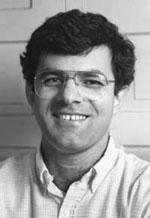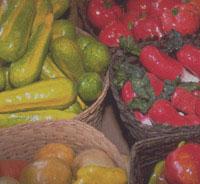Kamyar Enshayan is a folk music aficionado and a lifelong soccer fan. He lives in a comfortable house on a shady street in Cedar Falls, Iowa, with his four-year-old daughter, Nettie, and his wife, Laura Jackson, a biology professor at the University of Northern Iowa. They have a large vegetable garden. Laura is expecting their second child in December.

Enshayan takes a break from
causing trouble.
Their existence appears somewhat Rockwellian. But it’s a post-feminist, post-Earth Day kind of Rockwellian, what with Jackson researching the impacts of the huge hog farms currently proliferating in Iowa, and with Enshayan’s, er, history. Because this genial 40-year-old can raise hell when he wants to. Just ask any of the ag academics at Ohio State University, where Enshayan earned a Ph.D in agricultural engineering before signing on with the extension service there. It’s also where he started “The Memo War.”
In 1989, the year he got his doctorate, Enshayan sent a letter to the editor of the Journal of Soil and Water Conservation, blaming industrialized agriculture for a multitude of ills, from groundwater pollution to soil erosion rates that arguably exceeded those of the Dust Bowl.
“No concept of a land ethic seems to prevail among agriculturists, universities, and the educational system,” he wrote. “More than 200,000 farms went bankrupt in the 1980s. By almost any measure, rural communities are declining. Are [colleges of agriculture] building and revitalizing communities?”
This letter spurred a searing response from the dean emeritus of his own college, which Enshayan rebutted. Soon, a blizzard of memos was flying, as representatives of chemical companies (prodding Ohio State to tone Enshayan down) went head-to-head with members of the sustainable agriculture community (prodding the university to pay him heed).
“He was like a one-man revolution,” Ben Stinner, an Ohio State entomologist, told High Country News. “His big thing was to get people to talk about the assumptions underneath agriculture. He got them away from the technological aspects to underlying philosophy. He really played the part of the revolutionary, asking ‘Who are we serving? The corporations or the grassroots groups?’ He was very blunt and challenging.”
Giving Agro-business the Business
In 1993, Enshayan left Ohio State to join Laura in Cedar Falls, relieved to be out of the fray. The Memo War had skewered any chances he had of entering the tenure track at Ohio State, plus he was a resident foreigner without a green card, having spent the first 17 years of his life in his native Iran.

How does your garden grow?
But he didn’t just melt into the woodwork. He wrote a book, Dr. Twisted Visits a Farm, parodying the industrial ag ethic that prevailed at Ohio State. The book’s protagonist, Dr. Twisted, is an agricultural economist who writes off sustainable farmers as “vegetarian ideologues” and “old-order communists.” He points out that “currently, our food is grown in a filthy, four-letter-word medium, called soil, which is full of microorganisms.” Later, a panel of agricultural experts attributes the loss of small farms to the fact that “when you have small things you tend to lose them. It’s hard to keep track of all these small farms.” They add — and Enshayan says he actually heard a panel of ag experts discuss this — that the exorbitant expense of entering farming these days could be overcome if only the parents of this nation were generous enough to give farms to their children.
Enshayan also got involved in academics again, this time at Northern Iowa University. There, he continues to champion sustainable agriculture and question why Iowa shouldn’t trade in its monocultures of soybeans and corn for a more diverse, locally-based, lucrative agriculture.
Students from the environment, technology, and society course he teaches at the University of Northern Iowa have gotten the managers of two local Wal-Marts to admit that the chain has intentionally priced several local shops out of business. Other students have worked with the college cafeteria to find ways to buy local produce.
Going Native
Enshayan also directs the Local Food Project, which has spent three years linking up local vegetable farmers with the university, a hospital in the nearby town of Waterloo, and a restaurant called Rudy’s Tacos. Prior to their participation in the project, neither the university nor the hospital bought any locally grown produce. In their first year of participation, the hospital purchased 22 percent of its produce locally, and the university purchased 11 percent. Rudy’s upped its percentage of local produce from 37 to 47.

Fresh and local — yum.
For Enshayan, this kind of trend is healthy economically, environmentally, and spiritually.
“In Iowa in 1959, we had almost 9,000 acres of orchard. In 1992, we had only 3,000. What’s going on? In 1929, we produced 77,000 bushels of peaches, and in 1992 we produced 35,000! And grapes! In 1929, we produced 15 million pounds, and in 1992 we produced 11,000!
“Why can’t we have our own orchards? Economically, all these food dollars are leaving the state. We’re suggesting it’s not outrageous to expect that our region be more self-reliant. There are a lot of interrelated consequences. You get to know who produces it, you know your money isn’t going out of the state. You’re investing in the lives of farmers; you can actually be connected to the land around us.”
Iowa, concludes this exuberant, feisty man, should grow it all. “We should have everything!” he exults. “Why not?”
To get your own copy of Dr. Twisted Visits a Farm, send $8 to Kamyar Enshayan, 1703 Washington St., Cedar Falls, IA 50613-4053.

